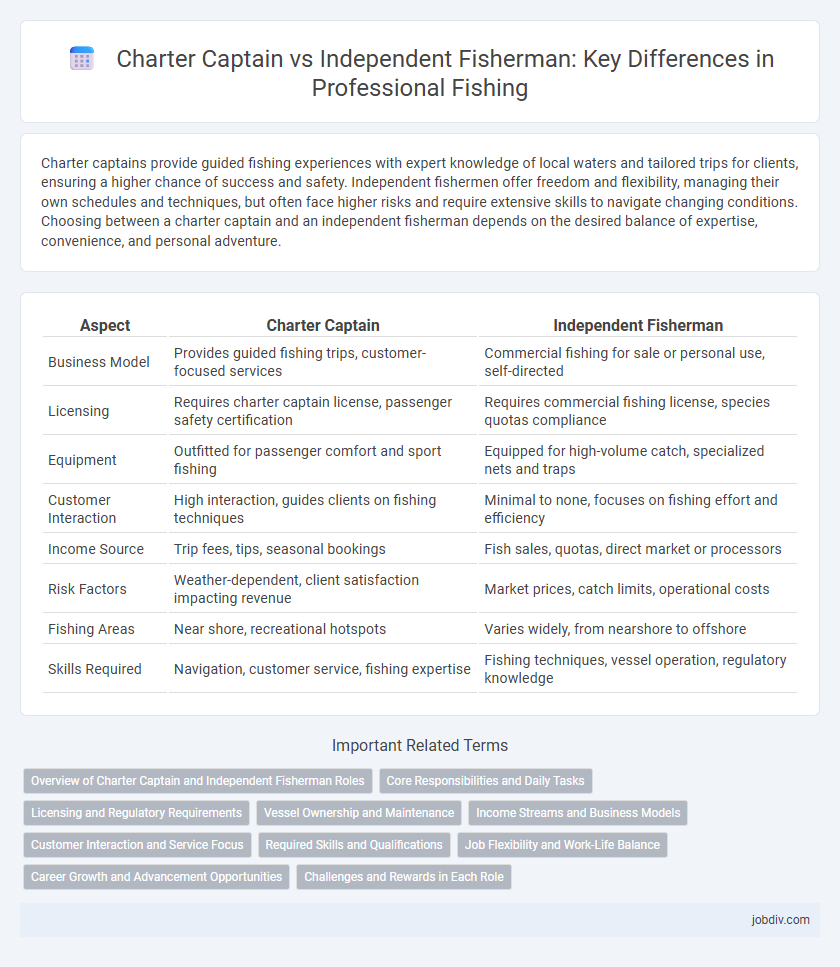Charter captains provide guided fishing experiences with expert knowledge of local waters and tailored trips for clients, ensuring a higher chance of success and safety. Independent fishermen offer freedom and flexibility, managing their own schedules and techniques, but often face higher risks and require extensive skills to navigate changing conditions. Choosing between a charter captain and an independent fisherman depends on the desired balance of expertise, convenience, and personal adventure.
Table of Comparison
| Aspect | Charter Captain | Independent Fisherman |
|---|---|---|
| Business Model | Provides guided fishing trips, customer-focused services | Commercial fishing for sale or personal use, self-directed |
| Licensing | Requires charter captain license, passenger safety certification | Requires commercial fishing license, species quotas compliance |
| Equipment | Outfitted for passenger comfort and sport fishing | Equipped for high-volume catch, specialized nets and traps |
| Customer Interaction | High interaction, guides clients on fishing techniques | Minimal to none, focuses on fishing effort and efficiency |
| Income Source | Trip fees, tips, seasonal bookings | Fish sales, quotas, direct market or processors |
| Risk Factors | Weather-dependent, client satisfaction impacting revenue | Market prices, catch limits, operational costs |
| Fishing Areas | Near shore, recreational hotspots | Varies widely, from nearshore to offshore |
| Skills Required | Navigation, customer service, fishing expertise | Fishing techniques, vessel operation, regulatory knowledge |
Overview of Charter Captain and Independent Fisherman Roles
Charter captains operate commercial vessels offering guided fishing trips for recreational clients, ensuring safety and maximizing catch experience with expert knowledge of local waters and fish behavior. Independent fishermen engage in commercial or subsistence fishing, often owning or leasing their boats, and focus on harvesting fish for market sale, relying heavily on their skills in navigation, equipment maintenance, and species identification. Both roles demand extensive maritime expertise, but charter captains prioritize client satisfaction and tourism, while independent fishermen emphasize productivity and fishery sustainability.
Core Responsibilities and Daily Tasks
Charter Captains primarily focus on guiding clients safely on fishing trips, managing navigation, maintaining vessel safety, and providing expert knowledge on local fishing spots. Independent Fishermen concentrate on sourcing, catching, and selling fish, often handling gear maintenance, fish processing, and complying with fishing regulations autonomously. The core responsibilities of Charter Captains center on customer experience and vessel operation, whereas Independent Fishermen emphasize fish harvesting and business management.
Licensing and Regulatory Requirements
Charter captains typically obtain commercial captain licenses such as the U.S. Coast Guard Operator of Uninspected Passenger Vessels (OUPV) or Master licenses, enabling them to legally carry paying customers. Independent fishermen must secure specific commercial fishing permits and endorsements that regulate gear types, catch limits, and fishing zones to comply with federal and state fisheries management. Both roles require adherence to rigorous safety standards, recordkeeping, and reporting mandates to ensure sustainable harvesting and legal operation.
Vessel Ownership and Maintenance
Charter captains typically own well-maintained vessels equipped for passenger comfort and safety, ensuring compliance with commercial fishing regulations and certifications. Independent fishermen invest significant resources in vessel upkeep, focusing on efficiency and durability to maximize catch and operational costs. Ownership responsibilities for both include regular inspections, repairs, and upgrades to maintain seaworthiness and regulatory standards.
Income Streams and Business Models
Charter captains primarily generate income through guided fishing trips, charging clients for experiences, gear rentals, and sometimes providing lodging packages, creating a service-based revenue model. Independent fishermen rely on selling their catch directly to markets, restaurants, or wholesalers, focusing on product sales and fluctuating market prices for income. While charter captains benefit from predictable booking schedules and tourism demand, independent fishermen face variable earnings tied to catch volume and seafood market conditions.
Customer Interaction and Service Focus
Charter Captains prioritize customer interaction, tailoring fishing experiences to meet client preferences and ensuring a memorable trip through personalized guidance and safety. Independent Fishermen focus primarily on maximizing their catch, often limiting direct customer engagement beyond the transaction of purchased fish. This service focus difference highlights the Charter Captain's role in enhancing recreational fishing through customized attention, compared to the production-driven approach of Independent Fishermen.
Required Skills and Qualifications
Charter captains must hold a captain's license from the U.S. Coast Guard, demonstrating advanced navigation, safety, and customer service skills essential for managing charter trips and ensuring passenger safety. Independent fishermen often require practical knowledge of fishing techniques, vessel maintenance, and resource management, alongside necessary permits for commercial fishing operations. Both roles demand strong seamanship and knowledge of local fishing regulations but diverge in the balance between technical expertise and customer-oriented skills.
Job Flexibility and Work-Life Balance
Charter Captains often benefit from a structured schedule with set client bookings, providing predictable work hours and enhanced work-life balance compared to Independent Fishermen, who face irregular hours and weather-dependent schedules. Independent Fishermen manage their own operations, allowing greater autonomy but requiring constant attention to market demand and environmental conditions, which can lead to less predictable downtime. The choice between the two roles hinges on prioritizing steady income and structured time versus flexibility and independent decision-making in the fishing industry.
Career Growth and Advancement Opportunities
Charter captains often experience structured career growth through certifications and building client networks, which can lead to higher earnings and management positions within fishing charters. Independent fishermen have the flexibility to expand their operations, increase catch volumes, and diversify fishing methods, yet face greater risks and less predictable advancement pathways. Both roles require continuous skill development, but charter captains benefit from steady income streams and professional recognition that support long-term career stability.
Challenges and Rewards in Each Role
Charter captains navigate the challenge of managing client expectations and safety while offering rewarding experiences through guided fishing trips and steady income. Independent fishermen face unpredictable market prices and harsh weather but gain autonomy and direct profit from their catch. Both roles demand deep knowledge of fishing techniques and marine environments, balancing risks with unique professional satisfactions.
Charter Captain vs Independent Fisherman Infographic

 jobdiv.com
jobdiv.com